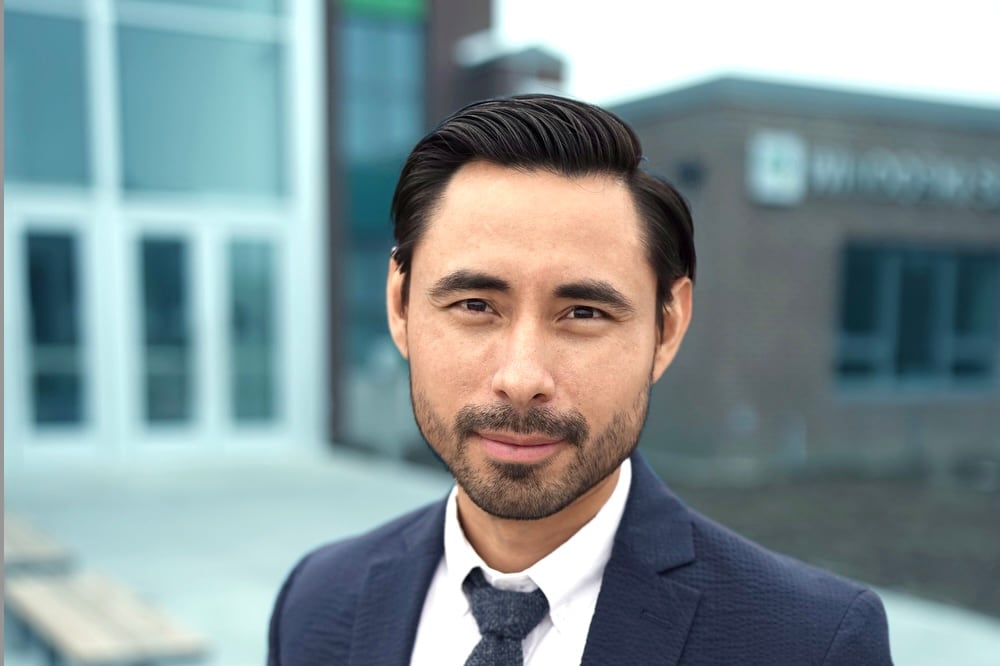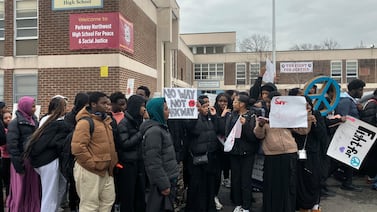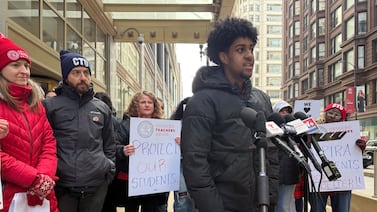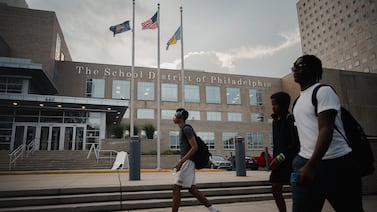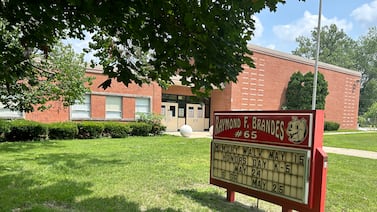Wilmer Chavarria was 5 when he began selling bread with his mom on the streets of Ocotal, Nicaragua, in the country’s northern mountains.
“We tried to do whatever we could do to survive,” said Chavarria, whose family had been displaced during Nicaragua’s bloody civil conflict. “That’s how I grew up. So when I think about the communities we are trying to protect now, to me, they’re not hypothetical.”
Chavarria, now 36, leads the Winooski School District in Winooski, Vermont, near Burlington. The district serves about 800 students, including many immigrant families who fled war, persecution, and poverty in their countries of origin.
Last week, Chavarria, a naturalized U.S. citizen, was traveling back from visiting his family in Nicaragua when he says federal agents detained him without explanation for hours at Houston’s international airport. Officials separated Chavarria from his husband and demanded access to his personal and district-issued devices.
Chavarria granted them permission to review his personal data — emails, texts, and photos — but explained that federal law prohibits him from releasing student information without a judicial order or a guardian’s consent. He also cited Winooski’s new sanctuary district policy, which limits federal agents’ access to school buildings and student data.
To gain entry to his devices, “They threatened me with sending me to the FBI, with making me lose my job, with tainting my record, so I would never get another job. They threatened me with extended detention,” he said.
Chavarria said he did not grant agents permission to review district files, but he fears student information may have been compromised while they searched his devices.
A spokesperson with U.S. Customs and Border Protection, or CBP, did not respond to questions about why Chavarria was detained and whether or not agents agreed not to access student data on his devices. In an emailed statement, the spokesperson said that inspections at ports of entry help combat serious crimes and that travelers are treated with dignity.
“All travelers entering the United States are subject to inspection, a process that can take time depending on the circumstances,” he said. “These essential inspections safeguard national security. CBP cannot disclose information that could compromise law enforcement intelligence.”
In an interview, Chavarria told Chalkbeat about his recent ordeal, why he pushed for Winooski’s sanctuary district declaration earlier this year, and how his detention will change his advice for immigrant families.
This interview has been edited for length and clarity.
Why was it important to you to make Winooski a sanctuary school district?
It only made sense for a school district that is the most diverse in the state to also be the one advancing policies that tell our families that we got their backs. And we’re not going to break the law by any means, but we’re not going to willingly compromise their information and their rights.
Not everyone in the community was on board, though. What kinds of pushback did you hear?
There were multiple things, the first one being, “Why are you calling attention to yourself? You’re just going to get Trump angry, and he’s going to take away funding from you.” Our response was, “He’s going to take funding away from us anyway.” So we’re not going to comply in advance. We’re not going to be cowards just because we want to keep the money.
The second argument was that this was not really a problem, that there’s already a law that protects student privacy. They said talking about this only causes more fear.
The whole point of being a different school district is to affirm how our students are unique and make policy and create practices based on that uniqueness. There are things we have to say out loud. And when you say, “You’re just going to create fear,” I’m like, “The people I’m talking to right here in my office are already terrified,” and the least we can do is send a message that we are with you.
You travel to Nicaragua to see your family regularly. What was different this time around?
I usually go through the Global Entry line because for years I’ve had Global Entry. You go for interviews and submit documentation, so I’ve always been a low-risk traveler and have never had to spend more than a few seconds at a port of entry. I didn’t expect anything different, especially being a U.S. citizen and doing this trip multiple times a year.
But this time, they stopped me in the line and called for someone to escort me into an interrogation area. [It seemed] clear that I was in the system before I even got there, but they didn’t disclose the reason.
They start separating me from my spouse, and my husband is saying, “We are married; we should not be separated unless he is being charged with something.” And the officer looks at us like he doesn’t believe us, like with a face of disgust.
I was sent into detention with no access to a phone call, no access to lawyers, no access to communications with anyone, and no access to any of my electronic devices. My husband was sent outside the airport, and every time he tried to come back to look for answers, he was met with extreme verbal aggression and intimidation. He just waited in the baggage claim area for four to five hours with no communication from me, no idea what was going on. That is the definition of psychological terror.
What were your worst fears in that moment?
My family has survived war, survived the worst that humans can do to other people. So being disappeared is not a new thought to me. And so I was less afraid about my physical safety and being disappeared than I was about what would happen to my family and to my spouse, who is outside, terrified, not knowing what’s happening to me. I was afraid of what this would mean for my mother. And I was afraid of what this would mean for the families and the students whose information might be compromised.
You said the officers who detained you tried to access your personal and district-issued devices with protected information on them. What did you tell them?
I continued to say, “I am consenting for you to search through my personal data, from texts to pictures to files to emails. You may not do that for our district data. You may not look through family or student information.”
Did they end up looking through your devices?
They did get access to the devices. They were the ones who finally said, “We promise you we’re not going to look through district files.” So I thought they were going to look through my devices, and I was going to see what they were looking through, but no. They took the devices away, and when they came back, maybe an hour later, I just had to take their word for it. … I’m not going to assume that they didn’t look through district data.
Did you tell your school community about a possible exposure?
After I was released, that same night, I wrote a lengthy letter to the school board, letting them know what had just happened, that the district information may have been tampered with. As soon as I arrived back to Vermont, I began to change my passwords.
The community has been informed … and is rightly very much concerned. The school district is calling on the different authorities to investigate this and to take very seriously the fact that student and family information may have been compromised and accessed illegally, when there was at no point consent for that to be the case.
Will your detention change what you tell your students?
I’m now finding out that my high school students knew better than I did because before this happened to me, I would have students in my office saying, “My family or myself, we’re thinking of traveling, but not sure. What do you advise us?” They saw me as someone who knows about immigration things, because I am an immigrant.
I would say, “Do you have a U.S. passport?” If they said yes, I would tell them, “You have nothing to worry about. You have constitutional rights, and you may not be denied entry into the United States, so please don’t worry so much.” My advice to students is definitely going to have to change because I have nothing but conviction now that having a U.S. passport and being a U.S. citizen doesn’t guarantee you rights.
Can you tell me about what brought many of your immigrant students and their families to Winooki?
We do have a high percentage of immigrant communities who are refugees from areas of conflict, who have gone through political situations that make it no longer safe for them to be in their home country. We have students from multiple African countries that have been or are going through terrible things. We have families from Syria. We have families from Nepal or Bhutan, who may be stateless. We have people from Latin America, fleeing persecution or extreme poverty. We also have people of privilege in their home countries who decided they want to immigrate to the United States and now live in Winooski. So it’s as diverse as it comes.
I know many school districts are doing Know Your Rights workshops for immigrant families. Are you planning anything like that this coming school year?
We’ve done multiple Know Your Rights workshops. We have an education station in the lobby of the district [office] with Know Your Rights materials in all the languages we serve. We have a home visiting program where we send a liaison who knows about rights to people’s homes to have conversations with them. There’s so much that we’ve been doing the past eight months or so that other districts, both in the state and across the nation, reach out to us for advice.
Last month [before I was detained], we were already preparing the agenda for the staff convocation for the opening of the school year. And the main thing, instead of bringing in a speaker, what we are doing is bringing students from different migrant communities to talk about the background of our communities and what geopolitical dynamics brought them here. Every staff member will be asked to rotate through two different language communities and learn about the history of those communities here in Winooski.
As someone who chose to immigrate to the U.S., to make your life here, to make your career here, how are you processing what happened to you last week?
I feel sad because I do not feel safe here. Every chance some people get to tell me that I don’t belong here and that I’m not wanted, they use it. But I feel even more saddened for the country as a whole, even people who are not immigrants, because we’re already in new territory where the character of the nation has been compromised, and where this country is almost unrecognizable. I think it’s not going to be too long until it’s too late to fix.
Gabrielle Birkner is the features editor and fellowship director at Chalkbeat. Email her at gbirkner@chalkbeat.org.

